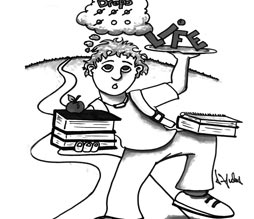By André Green/managing editor
This past holiday weekend while most of America was enjoying a day of barbecues and family, I was working.
My neighbor asked for help with an essay for high school. She was having trouble answering the question: What is the greatest problem facing my generation?
I suggested comparing the Civil Rights and Vietnam generation to today’s Iraq and iPod generation.
She could use examples like Medgar Evers, Stokely Carmichael, Huey Newton and Bobby Seale, but she had no idea who they were or what they had done.
Martin Luther King was easy, but she was oblivious as to why nearly a quarter of a million people marched on our nation’s capital one summer in 1963.
The first automobile, I learned, was a Ford built in the ’60s, and the first electronic communication device? A radio.
I then transformed from writing coach to history and English professor.
What she had written, I discovered, was full of grammatical errors and poor sentence structure.
Furthermore, I realized in those painstaking 90 minutes our students are failing, not only in school, but also in life.
They are squandering the free opportunities to learn and improve not only this country, but their futures. Their priorities—cell phones, iPods, Jordans and celebrities-—trump the importance of learning and understanding history and the ability to read and write.
Therein lies the problem as well as the answer. Society is quick to hold teachers and professors accountable for a student’s inability to progress in school, but the blame must be placed on the shoulders of those who treat education as if it were a burden.
Often, students do not comprehend what they have lost until they enter the work force: when they see the world as it really is. In hindsight, they realize perhaps they could have done something if they had listened to what those damn teachers were trying to teach and explain.
And my neighbor is a senior in high school and a representative of our future.
This generation must open its eyes, remove the ear buds, pick up a book and pull up its pants or the future will surely amount to nothing more than an endless cycle of ignorance for future generations.
That lack of knowledge is the greatest problem facing this generation.
“ When you turn 18, will you vote in the next election?” I asked.
“ Probably not,” she replied. “I know it won’t make a difference.”
“ Apathy,” I answered … and then we looked it up.




























